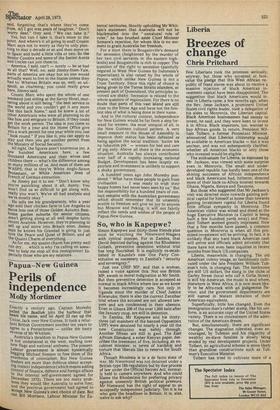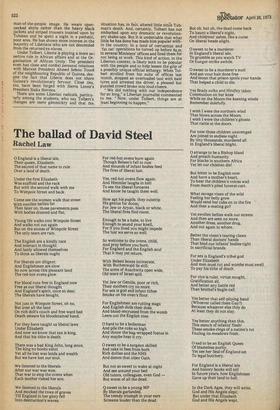Liberia
Breezes of change
Chris Pritchard
Few Liberians took the promises seriously, anyway, but those who accepted at facevalue the pledge that this West African re public of freed slaves was about to receive a massive injection of black American investment capital have been disappointed. The suggestion that black Americans would in vest in Liberia came, a few months ago, when the Rev. Jesse Jackson, a prominent United States civil rights leader, took a delegation of his aides to Monrovia, the Liberian capital. Black American businessmen had money to invest, he said, and they were keen to invest it in Africa. Black importers, too, wanted to buy African goods. In return, President Wil
liam Tolbert, a former Protestant Minister, announced that Liberian citizenship would be available to American blacks — but it was unclear, and was not subsequently clarified, whether all American blacks or only those who invested would be eligible.
The enthusiasm for Liberia, as espoused by Mr Jackson, was viewed with some surprise even in Monrovia. The small and underdeveloped republic has hardly been one of the shining successes of African independence and black Americans had, hitherto, directed more of their back-to-Africa interest towards Ghana, Nigeria, Kenya and Tanzania. But those who suggested that Mr Jackson's visit was directed more towards gaining political capital for himself at home than towards gaining investment capital for Liberia found little official sympathy in Monrovia. The American visitor was wined and dined at the huge Executive Mansion (a Capitol is being built a few hundred yards away) and President Tolbert seemed greatly impressed. Now that a few months have passed, a common question in Monrovia is when all this promised investment will be arriving. In fact, it is unlikely that any hard black American cash will arrive and officials admit privately that there have not even been inquiries in recent months from black US companies.
Liberia, meanwhile, is changing. The old American colony image, so fastidiously cultivated under the late President William Tubman's rule, is changing fast. The banknotes are still US dollars, the slang in the clubs of Garley Street (local wits call it Girlie Street) is still hip American, the music is soul where, elsewhere in West Africa, it is now more likely to be Afro-rock with an kndigenous flavour, and the government departments are still named in blatant imitation of their American equivalents. Superficially, little has changed. Even the immigration man's rubber stamp, like his uniform, is an accurate copy of the United States variety. There is no concealment of the admiration of the American dream.
But, simultaneously, there are significant changes. The stagnation tolerated, even en couraged, by Tubman and his oligarchy of wealthy ex-slave families is slowly being eroded by real development projects. Under Tolbert, an agricultural scheme is more likely than grandiose constructions such as Tubman's Executive Mansion . Tolbert has tried to cultivate more of a man-of-the-people image. He wears opennecked shirts rather than the heavy black jackets and striped trousers insisted upon by Tubman and he spent a night in a pathetic, poor area. He has shown more interest in the majority of Liberians who are not descended from the returned ex-slaves.
Under Tolbert, Liberia is playing a more as-1 sertive role in African affairs and at the Organisation of African Unity. The president even has close and cordial personal relations with Marxist President Ahmed Sekou Toure of the neighbouring Republic of Guinea, despite the fact that Liberia does not share Guinea's revolutionary fervour. Close ties, too, have been forged with Sierra Leone's President Siaka Stevens.
There are some Liberian radicals, particularly among the students, who say Tolbert's changes are mere gimmickry and that the,
situation has, in fact, altered little singe Tubman's death. And, certainly, Tolbert has not embarked upon any dramatic or revolutionary shake-ups. But it is undeniable that what little he has done has made him popular within the country. In a land of corruption and 'fat cat' operations he turned up before 8a.m. in several Ministers' offices and fired them for not being at work. This kind of action, in the Liberian context, is likely both to be popular with the people and to help lessen the grip of a possibly unique official lethargy. When Tolbert strolled from his suite of offices last month, stopped an overloaded taxi with bald tyres and arrested the driver, a pleased but puzzled crowd broke into loud cheers.
"We did nothing with our independence for so long," a Liberian journalist commented to me. "Now, under Tolbert, things are at least beginning to happen."



































 Previous page
Previous page